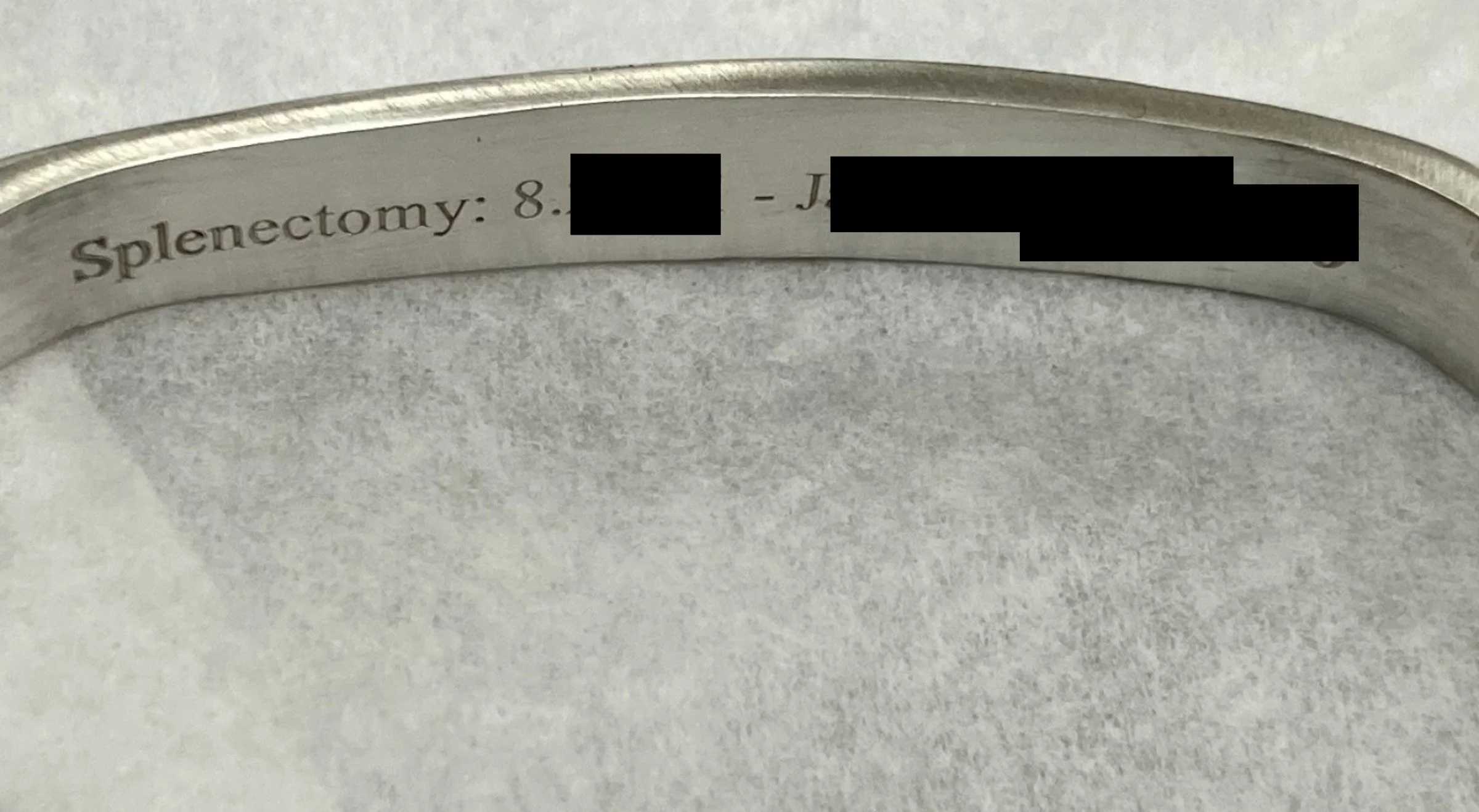Splenectomy Medical ID Bracelets
A splenectomy is a surgical procedure that involves the removal of the spleen. The spleen is an organ located in the upper left abdomen, and it plays a crucial role in the immune system and the body's ability to fight infections. Splenectomy may be necessary for a variety of reasons, including injuries, cancer, and blood disorders. While the procedure can be life-saving, it also carries certain risks and can have long-term effects on the body.
Why It Is Crucial To Wear A Medical ID If You Have A Splenectomy:
Wearing a medical ID bracelet or necklace is essential for people who have had a splenectomy. Here's why:
In case of emergency: In an emergency situation, medical professionals may not be aware that the patient has had a splenectomy. A medical ID can provide critical information about the patient's medical history.
Avoiding misdiagnosis: Many of the symptoms of a splenectomy can be mistaken for other conditions. Wearing a medical ID can help prevent misdiagnosis and ensure that the patient receives appropriate treatment.
Communicating with medical professionals: A medical ID can provide essential information about the patient's condition, medication, and treatment plan, which can be useful in communicating with medical professionals.
Preventing infections: Without a spleen, the body is more vulnerable to infections, particularly from certain types of bacteria. A medical ID can alert medical professionals to the patient's increased risk of infection and the need for preventative measures.
Symptoms of Splenectomy
The removal of the spleen can have several short-term and long-term effects on the body. Some common symptoms include:
Pain in the upper left abdomen
Infection: Without a spleen, the body is more vulnerable to infections, particularly from certain types of bacteria.
Fatigue and weakness: Many people experience fatigue and weakness after a splenectomy.
Anemia: The loss of the spleen can lead to a decrease in the number of red blood cells, which can result in anemia.
Thrombocytosis: In some cases, the removal of the spleen can lead to an increase in the number of platelets in the blood, which can increase the risk of blood clots.
Treatment of Splenectomy
The treatment of splenectomy depends on the reason for the surgery and the symptoms the patient experiences. Some common treatments include:
Antibiotics: People who have had a splenectomy may need to take antibiotics to prevent infections, particularly from certain types of bacteria.
Vaccines: People who have had a splenectomy may need to receive certain vaccines, such as the pneumococcal vaccine, to help protect against infections.
Blood transfusions: In some cases, people who have had a splenectomy may need blood transfusions to treat anemia or other blood-related conditions.
Medications: Medications such as anticoagulants may be prescribed to reduce the risk of blood clots in people who have had a splenectomy.
A splenectomy is a surgical procedure that can have significant short-term and long-term effects on the body. While it can be life-saving, it is important for people who have had a splenectomy to be aware of the potential risks and take steps to manage their symptoms. Wearing a medical ID bracelet or necklace is essential for people who have had a splenectomy, as it can provide critical information about their medical history and help ensure that they receive appropriate treatment in case of an emergency. By taking these steps, people who have had a splenectomy can live healthy and fulfilling lives.
Splenectomy Online Resources
Spleen Australia: Spleen Australia is a nonprofit organization that aims to support individuals who have had their spleens removed and raise awareness about the importance of splenic health. They offer resources, information, and support for people living without a spleen.
Spleen Trust: Spleen Trust is another Australian organization that provides information and resources for people who have had their spleens removed. They focus on promoting health and well-being for those living without a spleen.
Aplastic Anemia & MDS International Foundation (AAMDSIF): While not solely focused on splenectomy, AAMDSIF offers resources and support for individuals with bone marrow failure disorders, including aplastic anemia and myelodysplastic syndromes (MDS), which might lead to the need for a splenectomy.
American Society of Hematology (ASH): ASH provides information on various hematological conditions, including those that might require a splenectomy. They offer resources, educational materials, and information about ongoing research in the field.
